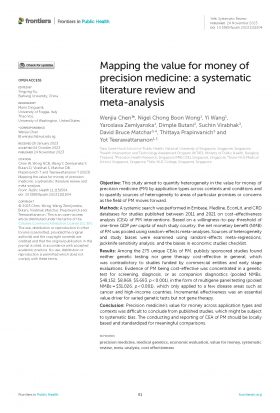This website uses cookies so that we can provide you with the best user experience possible. Cookie information is stored in your browser and performs functions such as recognising you when you return to our website and helping our team to understand which sections of the website you find most interesting and useful.
Mapping the value for money of precision medicine: a systematic literature review and meta-analysis

รายละเอียดเพิ่มเติม
About the study
Objective: This study aimed to quantify heterogeneity in the value for money of precision medicine (PM) by application types across contexts and conditions and to quantify sources of heterogeneity to areas of particular promises or concerns as the field of PM moves forward.
Methods: A systemic search was performed in Embase, Medline, EconLit, and CRD databases for studies published between 2011 and 2021 on cost-effectiveness analysis (CEA) of PM interventions. Based on a willingness-to-pay threshold of one-time GDP per capita of each study country, the net monetary benefit (NMB) of PM was pooled using random-effects meta-analyses. Sources of heterogeneity and study biases were examined using random-effects meta-regressions, jackknife sensitivity analysis, and the biases in economic studies checklist.
Results: Among the 275 unique CEAs of PM, publicly sponsored studies found neither genetic testing nor gene therapy cost-effective in general, which was contradictory to studies funded by commercial entities and early stage evaluations. Evidence of PM being cost-effective was concentrated in a genetic test for screening, diagnosis, or as companion diagnostics (pooled NMBs, $48,152, $8,869, $5,693, p < 0.001), in the form of multigene panel testing (pooled NMBs = $31,026, p < 0.001), which only applied to a few disease areas such as cancer and high-income countries. Incremental effectiveness was an essential value driver for varied genetic tests but not gene therapy.
Conclusion: Precision medicine’s value for money across application types and contexts was difficult to conclude from published studies, which might be subject to systematic bias. The conducting and reporting of CEA of PM should be locally based and standardized for meaningful comparisons.
https://www.frontiersin.org/articles/10.3389/fpubh.2023.1151504/full




